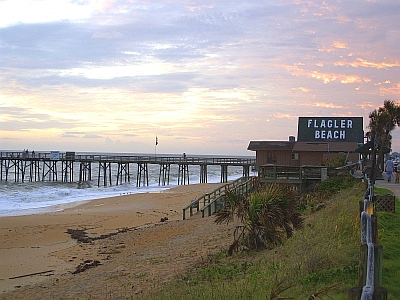
Moving to Flagler Beach, Florida: A Comprehensive Relocation Guide
Considering moving to Flagler Beach, Florida? This small coastal city offers Old Florida beach town character, fishing pier, and laid-back atmosphere. With approximately 5,500 residents in 2025, Flagler Beach combines authentic beach living with access to St. Augustine and Daytona Beach.
Demographic Profile to Consider If Moving to Flagler Beach:
Flagler Beach’s 2025 population is approximately 5,500 residents in this narrow barrier island city in Flagler County. The median age is around 55 years, with retirees, artists, surfers, and families seeking small-town beach living. The population is approximately 85% White, 8% Hispanic, creating a predominantly retiree community. The city stretches along a narrow strip of land between the Atlantic Ocean and the Intracoastal Waterway, with most properties within walking distance of the beach. State Road A1A runs through town as the main street lined with small businesses, restaurants, and beach motels. Flagler Beach maintains Old Florida character, resisting overdevelopment and preserving its casual beach town atmosphere. The community attracts those seeking authentic coastal living away from resort commercialization. Find trusted local services for moving, living, and working in Flagler Beach.Flagler Beach Relocation Directory
Cost of Living to Consider If Moving to Flagler Beach:
Flagler Beach offers moderate to upper-moderate costs for Atlantic Coast living. Median home values range from $400,000 to $550,000 in 2025, with beachfront properties commanding premiums. The median household income is approximately $60,000 to $70,000. Rental properties average $1,800 to $2,400 monthly. Florida’s lack of state income tax benefits residents, though coastal property insurance requires budgeting. Overall cost of living is competitive for beachfront communities, with Flagler Beach providing value compared to nearby St. Augustine while offering direct ocean access. The city’s small size and limited development maintain character while keeping prices somewhat accessible for those seeking authentic beach town living.
Economy and Job Market:
Flagler Beach’s economy centers on tourism, hospitality, retail, and fishing. The city’s restaurants, beach motels, surf shops, and small businesses along A1A create service employment. The historic Flagler Beach Pier attracts fishing enthusiasts and tourists. Many residents are retirees or work in service industries supporting the beach economy. Some commute to Palm Coast for employment in healthcare, retail, and professional services. Others work in St. Augustine or Daytona Beach. The local economy operates on a smaller scale than neighboring cities, with seasonal tourism patterns influencing employment. Small business owners and independent contractors find the community supportive of local commerce.
Education:
Flagler County Schools serves Flagler Beach students, with nearby schools including Old Kings Elementary School and Buddy Taylor Middle School. High school students typically attend Flagler Palm Coast High School. The district operates schools throughout Flagler County. Daytona State College provides associate degrees and workforce training at nearby campuses. The University of Central Florida and University of North Florida are within commuting distance for four-year programs. The educational infrastructure adequately serves the small permanent population, with the district accommodating beach community characteristics.
Recreation and Lifestyle:
Flagler Beach’s 6 miles of uncrowded Atlantic Ocean beaches define the recreational landscape. The historic Flagler Beach Pier extends into the ocean providing fishing, dining, and ocean views. The city maintains a casual surf town atmosphere with local surf shops and beach culture. Veterans Park offers beach access and facilities. Residents enjoy fishing, surfing, kayaking in the Intracoastal Waterway, and beach walks. The small downtown along A1A features locally-owned restaurants, bars, and shops. The city hosts community events including the Flagler Brewfest and seasonal festivals. Nearby attractions include Washington Oaks Gardens State Park and Gamble Rogers Memorial State Recreation Area. The relaxed pace and authentic beach character create a lifestyle focused on ocean, community, and simplicity. The subtropical climate enables year-round beach activities.
Healthcare and Services:
Flagler Beach residents access healthcare through AdventHealth Palm Coast and Florida Hospital Flagler providing comprehensive services. Additional facilities in Palm Coast offer medical offices and urgent care. Daytona Beach hospitals are 30 minutes south for specialized care. The area’s healthcare infrastructure serves the local population, with regional facilities accessible when needed.
Transportation:
Flagler Beach is accessed via State Road A1A along the coast and State Road 100 connecting to Interstate 95. Daytona Beach International Airport is approximately 30 minutes south. Flagler County Public Transportation operates limited bus service. Most residents rely on personal vehicles. The city’s compact size makes some areas walkable, and bicycles are popular for local travel along A1A.
Conclusion:
Moving to Flagler Beach in 2025 offers authentic Old Florida beach town living with fishing pier, uncrowded beaches, and small-town character. The city’s laid-back atmosphere, surf culture, and resistance to overdevelopment make it ideal for those seeking genuine coastal lifestyle between St. Augustine and Daytona Beach.

